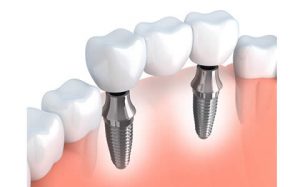Specialist Dentistry – Prosthodontics In Bedford
When our patients need more than a routine procedure
 Taking good care of our teeth and gums at home, combined with regular professional care, will hopefully mean that most of us will avoid all but the more routine dental treatments, such as fillings, during our lifetime.
Taking good care of our teeth and gums at home, combined with regular professional care, will hopefully mean that most of us will avoid all but the more routine dental treatments, such as fillings, during our lifetime.
This isn’t always the case though and sometimes other factors can play a role in what happens to our teeth. Accidents are an obvious one but also side effects of medication and pure bad luck can leave us requiring more complex oral care.
The good news for patients of The Dental Centre Bedford, is that we have highly experienced dentists at our practice who work in the specialist fields of dentistry. There are three main ones at our local clinic:
Endodontics – This deals with the inside of our teeth and involves procedures such as a root canal treatment.
Periodontics – This focuses largely on gum disease, especially in its more advanced stage. Treatments such as a root planing/deep clean might be expected here.
Prosthodontics – This largely involves the replacement or repair of missing teeth. We will discuss this particular area now.
When might you need a prosthodontist?
Tooth loss can happen to any of us, but more so if we don’t take good care of our teeth. Whilst most of us will want to replace a missing front tooth, it may be tempting not to replace one that is less visible. This can have a number of long term effects. These include additional wear, and therefore likely premature damage, to other teeth when we use them to replace the role of the missing tooth. Crooked teeth can occur as a missing tooth creates a gap for other teeth to ‘drift’ into. Finally, when a tooth is lost, the bone in that area is reabsorbed by the body for use in other areas. This can lead to small changes in the shape of our face.
What does a prosthodontist do?
As briefly mentioned earlier, a prosthodontist replaces missing teeth by artificial means. Naturally, it is more complex than that and will require a consultation beforehand to decide which is the best method for your own individual circumstances. For example, dental implants (more on those later) are generally accepted to be the best solution, but, if you are an extremely anxious patient, you might decide that you can’t face the relatively lengthy initial treatment involved. For you, dentures, which can be provided non-invasively in most cases, might be a more appropriate solution. You can be sure that any treatment selected will be via a full discussion and you will not be pushed into any particular solution. Our dentist may strongly recommend a particular one based on his/her experience, but the final choice will be yours.
Prosthodontic options
Let us take a look then at some of the options available for replacing a missing tooth or teeth.
Dentures
Probably the best known method and one that has been around for many years. Although initially and historically largely used for cosmetic purposes and often impractical for eating etc, dentures have become much more advanced and now provide not only aesthetic improvements but are more useful for everyday functions like eating and talking. Unfortunately, some wearers still find them to be uncomfortable and also limiting in their use when eating certain foods. This can lead wearers to choose a more restrictive diet based on how easy things are to eat, rather than how good they taste.
Bridges
A bridge is a more stable solution but is not without its ‘issues’. To place the restoration, dental crowns may be attached to the teeth either side of the gap. Whilst this does offer more strength and stability than dentures, it also means that often healthy teeth need to be prepared and shaped so that the supporting crown can fit securely. Understandably, many people are reluctant to have this done to healthy teeth. Bridges can also, like dentures, be quite fiddly to keep clean.
Dental implants
One of the most innovative discoveries in dentistry in the last century was the fact that titanium, when placed into bone, binds with it, causing it to ‘fuse’ together. Although this was an accidental discovery in an unrelated experiment, it has provided dentists with a treatment that not only replaces the crown section of the tooth, but the root as well. This is a very important development as it means that a tooth replaced using this method will provide a level of strength and stability that no other tooth replacement treatment can offer. Once a dental implant has been placed and allowed to fuse with the bone, you will have a replacement tooth that is as strong as a natural healthy tooth. Teeth implants can last for around twenty years and be relatively problem free if you look after them correctly.
Missing teeth are no fun and there are now a number of treatment options to replace them. If you have a missing tooth, or a number of missing teeth, and would like to see one of our local team to discuss this, you can contact us by calling The Dental Centre Bedford on 01234 819868.
